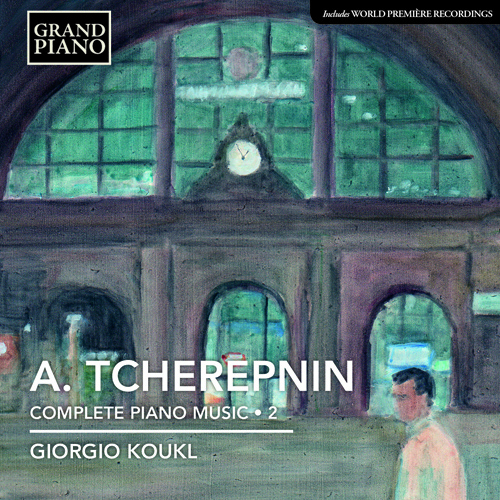
About this Release
“If there were specific historical periods where music was really fascinating, they would be the beginning of 20th century in St. Petersburg, the 1930s in Paris and during the Second World War in the USA. Alexander Tcherepnin was present during all three of them. His reaction to all these inputs was personal, highly original and enriching. It is exactly this mixture that makes my work with his music so rewarding. Tcherepnin needs to be better known and I hope this CD will contribute to that.” — Giorgio Koukl
TCHEREPNIN, ALEXANDER (1899–1977)
Complete Piano Music • 2
- Giorgio Koukl, piano
From an artistic family, whose own father had been a pupil of Rimsky-Korsakov, Russian composer, pianist and conductor Alexander Tcherepnin had written music from a very young age. An exile from his native country in 1921, he was later based in Paris and the United States where he continued to write music in every genre. Concentrating on his early piano works, this disc shows how Alexander Tcherepnin’s mastery of the miniature was allied to huge imagination. The Pieces sans titres, Op. 7 are richly characterised gems and the Petite Suite, Op. 6 teems with resourceful vitality. By the time of Message, Op. 39, composed in 1926, and one of his masterpieces, he had developed an arrestingly dramatic approach to rhythm.
This recording was made on a modern instrument: Steinway, Model D
Tracklist
|
Sonatine romantique, Op. 4 (1918) (00:12:00 )
|
|
1
I. Allegro * (00:03:12)
|
|
2
II. Canzonetta * (00:02:11)
|
|
3
III. Andantino * (00:02:41)
|
|
4
IV. Tempestoso * (00:03:49)
|
|
Petite Suite, Op. 6 (1919) (00:10:00 )
|
|
5
I. Marche (00:01:23)
|
|
6
II. Chant sans paroles (00:01:52)
|
|
7
III. Berceuse (00:01:47)
|
|
8
IV. Scherzo (00:02:04)
|
|
9
V. Badinage (00:00:50)
|
|
10
VI. Humoresque (00:01:34)
|
|
11
Toccata No. 1, Op. 1 (1921) * (00:05:34)
|
|
Pieces sans titres, Op. 7 (1917) (00:09:00 )
|
|
12
No. 1. Allegro * (00:01:26)
|
|
13
No. 2. Allegretto * (00:00:53)
|
|
14
No. 3. Moderato * (00:01:20)
|
|
15
No. 4. Andantino * (00:01:17)
|
|
16
No. 5. Allegro molto * (00:00:45)
|
|
17
No. 6. Sostenuto * (00:01:07)
|
|
18
No. 7. Allegretto * (00:00:49)
|
|
19
No. 8. Impetuoso * (00:00:49)
|
|
20
Nocturne No. 1, Op. 2, No. 1 (1919) * (00:03:23)
|
|
21
Dance No. 1, Op. 2, No. 2 (1919) * (00:03:39)
|
|
22
Nocturne No. 2, Op. 8, No. 1 (1919) * (00:03:55)
|
|
23
Dance No. 2, Op. 8, No. 2 (1919) * (00:03:23)
|
|
24
Scherzo, Op. 3 (1917) (00:03:36)
|
|
25
Message, Op. 39 (1926) * (00:09:35)
|
The Artist(s)
 Giorgio Koukl is a Czech pianist/harpsichordist and composer. He studied at both the Conservatories of Zürich and Milan, where he took part in the masterclasses of Nikita Magaloff, Jacques Février, and Stanislaus Neuhaus, and with Rudolf Firkušný, friend and advocate of Czech composer Bohuslav Martinů. It was through Firkušný that Koukl first encountered Martinů‘s music, and is now considered one of the world’s leading interpreters of Martinů‘s piano music. As a logical continuation of this work, Koukl has recorded the complete solo piano works of Paul Le Flem, Alexander Tcherepnin, Arthur Lourié, Vítězslava Kaprálová, Witold Lutosławski, and more recently, Alexandre Tansman and Tibor Harsányi.
Giorgio Koukl is a Czech pianist/harpsichordist and composer. He studied at both the Conservatories of Zürich and Milan, where he took part in the masterclasses of Nikita Magaloff, Jacques Février, and Stanislaus Neuhaus, and with Rudolf Firkušný, friend and advocate of Czech composer Bohuslav Martinů. It was through Firkušný that Koukl first encountered Martinů‘s music, and is now considered one of the world’s leading interpreters of Martinů‘s piano music. As a logical continuation of this work, Koukl has recorded the complete solo piano works of Paul Le Flem, Alexander Tcherepnin, Arthur Lourié, Vítězslava Kaprálová, Witold Lutosławski, and more recently, Alexandre Tansman and Tibor Harsányi. The Composer(s)
 Alexander began playing piano and composing at an early age. By his late teens he had composed several hundred pieces, thirteen piano sonatas among them. For a more extensive biography of Alexander Tcherepnin, and information about his works and compositional techniques, visit the Tcherepnin Society website at www.tcherepnin.com.
Alexander began playing piano and composing at an early age. By his late teens he had composed several hundred pieces, thirteen piano sonatas among them. For a more extensive biography of Alexander Tcherepnin, and information about his works and compositional techniques, visit the Tcherepnin Society website at www.tcherepnin.com. Reviews

“Giorgio Koukl, true master of contrasting and powerful playing, delivers these muscled works with ease and nature and signs a reference straight away” – Classica

“Giorgio Koukl’s playing is phenomenal... This disc was a truly superb listening experience.” – MusicWeb International

“Focusing on Tcherepnin’s early years, this volume contains some super music. The performances are committed and energetic.” – BBC Music Magazine
“Koukl proves himself a most sympathetic advocate for Tcherepnin’s music, whether on a small or large scale.” – International Piano
“I repeat my previous comments on the impeccable clarity of Giorgio Koukl’s playing and the beautiful natural piano sound of this Swiss recording that I much enjoyed in the first release.” – David’s Review Corner

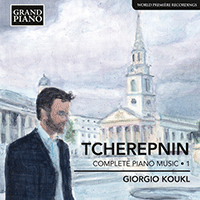
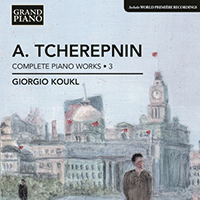
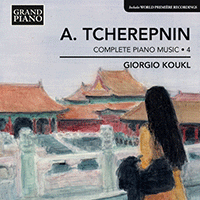
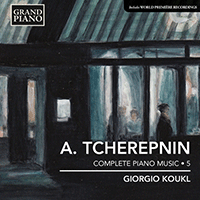
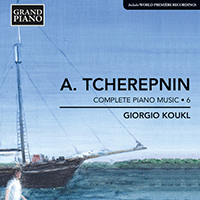
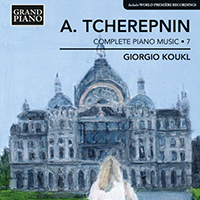
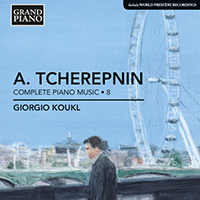
 Grand Piano has gained a reputation for producing high quality recordings of rare keyboard gems. Dedicated to the exploration of undiscovered piano repertoire, the label specialises in complete cycles of piano works by many lesser-known composers, whose output might otherwise have remained unknown and unrecorded.
Grand Piano has gained a reputation for producing high quality recordings of rare keyboard gems. Dedicated to the exploration of undiscovered piano repertoire, the label specialises in complete cycles of piano works by many lesser-known composers, whose output might otherwise have remained unknown and unrecorded.






